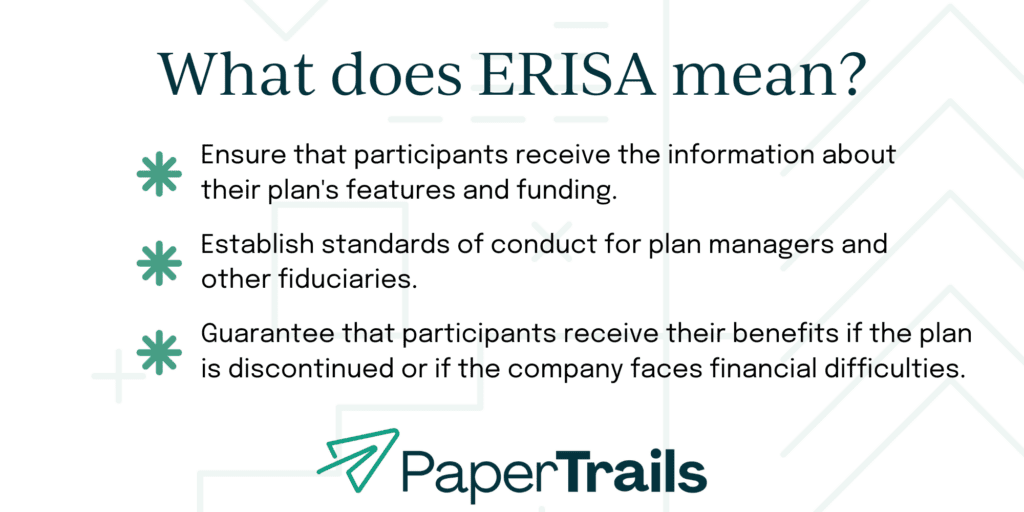Navigating the web of federal and state labor regulations can be challenging for small business owners. Keeping up with these mandates is not only crucial for legal compliance but also for the successful management of employee benefits. This article will delve deep into the question, “What is ERISA?”.
By the end, you’ll have a clear understanding of what ERISA is, the plans it covers, and its implications for your business. At Paper Trails, our primary goal is to empower business owners like you with accurate and timely information, ensuring that your business remains compliant with the vast landscape of labor regulations.
What is ERISA?
ERISA, or the Employee Retirement Income Security Act of 1974, is a federal law designed to protect employees who participate in retirement plans and health benefit plans offered by their employers. It establishes minimum standards for these plans to ensure that the promises made by employers regarding these benefits are kept. The principal objectives of ERISA are to:
- Ensure that participants receive the information about their plan’s features and funding.
- Establish standards of conduct for plan managers and other fiduciaries.
- Guarantee that participants receive their benefits even if the plan is discontinued or if the company faces financial difficulties.

How does ERISA coverage work?
For small business owners, understanding compliance requirements can be a crucial part of managing employee benefits. Once a plan is established as an ERISA plan:
- The employer must provide participants with important information about the plan’s features and its financial status. This often comes in the form of a Summary Plan Description (SPD).
- Plans must establish a grievance and appeals process for participants to get benefits from their plans.
- Fiduciaries of the plan (those responsible for managing it) must follow specific principles of conduct.
- ERISA also includes provisions for ensuring that employees have certain rights related to benefit accrual if they change jobs or if their employer’s business is acquired.
Furthermore, business owners should be aware of the Department of Labor’s reporting and disclosure requirements concerning ERISA. This ensures transparency and maintains the trust of employees who rely on these benefit plans.
What is considered an ERISA plan?
ERISA covers a broad range of employee benefit plans. An ERISA plan is typically any plan, fund, or program established by an employer (or employee organization) to provide retirement income or deferred income to employees. This includes:
- Pension plans, both defined benefit and defined contribution plans.
- Health benefit plans, including medical, dental, and vision.
- Some additional plans like life insurance, disability insurance, and apprenticeship plans.
However, there are exceptions. Not all benefit plans are ERISA plans. For instance, plans maintained solely for compliance with workers’ compensation, unemployment, or disability laws are not covered by ERISA.
Who is covered under these types of plans?
ERISA covers most private-sector employees, but there are exceptions. Employees covered by ERISA include those working for businesses, partnerships, and sole proprietorships. However, ERISA typically does not cover plans maintained by governmental entities, churches for their employees, or plans maintained outside the U.S. primarily for the benefit of non-resident aliens.
It’s essential for small business owners to understand which of their employees fall under ERISA’s umbrella to ensure the proper management and offering of benefits.
How Do Business Owners Stay Compliant with ERISA?
ERISA, with its intricate regulations, can seem like a challenging landscape for small business owners to navigate. However, by understanding its core principles and taking proactive steps, maintaining compliance becomes manageable. Here’s a roadmap for ensuring your business stays ERISA-compliant:
Stay Educated:
Laws and regulations are subject to change. Regularly review the Department of Labor’s updates and consult ERISA-specific publications. Consider attending seminars or workshops on ERISA compliance.
Appoint a Fiduciary:
Designate a trustworthy individual or team responsible for overseeing the management of your ERISA-covered plans. This fiduciary should be well-versed in these requirements and act in the best interests of plan participants.
Maintain Accurate Records:
Proper record-keeping is fundamental. Ensure that all relevant documents—plan descriptions, annual reports, and other necessary records—are maintained and updated. Store these records securely and make them accessible to plan participants upon request.
Provide Required Documents to Participants:
Regularly distribute the Summary Plan Description (SPD) to all plan participants. When there are significant changes to the plan, ensure that a Summary of Material Modifications (SMM) is also shared.
Annual Reporting:
File the required annual reports, typically the Form 5500, with the federal government. This form offers transparency into the plan’s financial condition and operations.
Conduct Regular Plan Audits:
Periodically review your plans to ensure they meet ERISA’s requirements. For larger plans, this may involve engaging an external auditor.
Training and Education for Staff:
Ensure that HR staff or those responsible for managing employee benefits are well-trained in ERISA requirements. This can prevent inadvertent violations.
In essence, compliance is a combination of proactive management, clear communication, and a commitment to the well-being of your employees. While it might require effort and diligence, ensuring compliance is an investment in the stability and reputation of your business.
Conclusion
In conclusion, ERISA is a vital piece of legislation that ensures the protection of employees’ rights related to benefit plans. Small business owners, with the support of resources like what we provide at Paper Trails can navigate these requirements, offering their teams the benefits they deserve while staying compliant with the law. Contact us today for help!